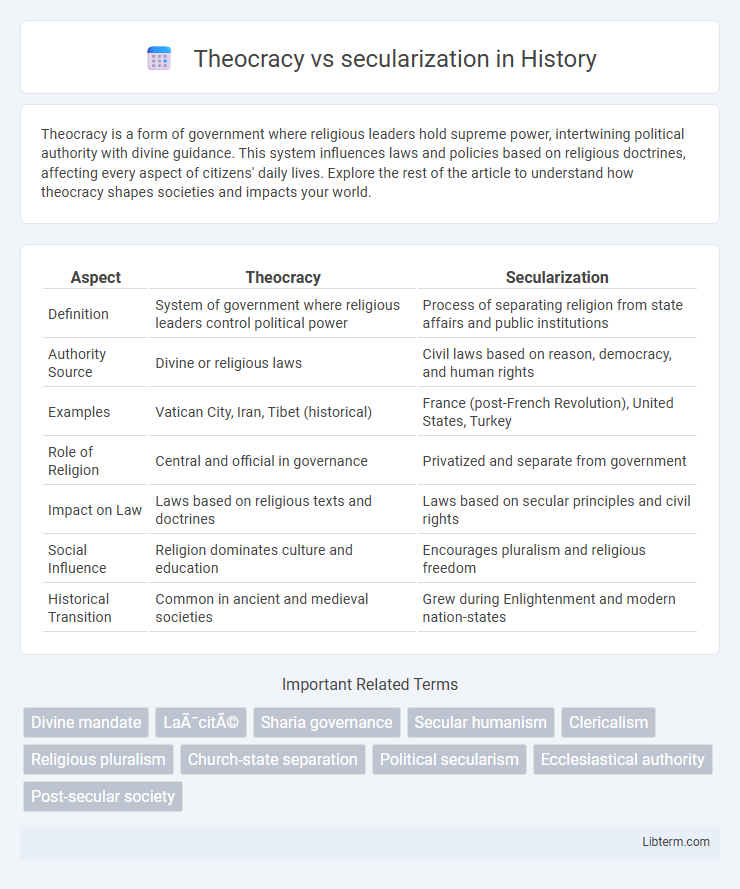Theocracy is a form of government where religious leaders hold supreme power, intertwining political authority with divine guidance. This system influences laws and policies based on religious doctrines, affecting every aspect of citizens' daily lives. Explore the rest of the article to understand how theocracy shapes societies and impacts your world.
Table of Comparison
| Aspect | Theocracy | Secularization |
|---|---|---|
| Definition | System of government where religious leaders control political power | Process of separating religion from state affairs and public institutions |
| Authority Source | Divine or religious laws | Civil laws based on reason, democracy, and human rights |
| Examples | Vatican City, Iran, Tibet (historical) | France (post-French Revolution), United States, Turkey |
| Role of Religion | Central and official in governance | Privatized and separate from government |
| Impact on Law | Laws based on religious texts and doctrines | Laws based on secular principles and civil rights |
| Social Influence | Religion dominates culture and education | Encourages pluralism and religious freedom |
| Historical Transition | Common in ancient and medieval societies | Grew during Enlightenment and modern nation-states |
Understanding Theocracy: Definition and Key Features
Theocracy is a system of government where religious leaders rule in the name of a deity, often integrating religious law as the foundation of political authority. Key features include the fusion of church and state, absence of secular institutions, and governance based on sacred texts such as the Quran, Bible, or Torah. This contrasts with secularization, which promotes the separation of religion from political and public life, emphasizing civil laws and pluralistic governance.
What is Secularization? Concepts and Evolution
Secularization refers to the transformation whereby religion loses its social, cultural, and political influence in society, leading to a separation between religious institutions and state governance. The concept evolved through historical processes like the Enlightenment, modernization, and industrialization, emphasizing rationality over religious dogma. Secularization theory highlights the decline in religious authority and the rise of secular ideologies that shape public life and policies.
Historical Development of Theocratic Societies
The historical development of theocratic societies reveals a governance system where religious authority and political power are intertwined, often seen in ancient Egypt, Mesopotamia, and later in medieval Europe and Islamic caliphates. These societies established laws based on divine commandments, integrating religious institutions directly into the state apparatus to maintain social order and legitimacy. Over time, challenges such as Enlightenment ideals and increasing secularization movements led to the gradual decline of theocratic governance in favor of secular states separating religion from political authority.
Secularization Through the Ages: Major Milestones
Secularization evolved through key historical milestones, including the Enlightenment's emphasis on reason over religious authority and the French Revolution's establishment of state secularism. The 19th and 20th centuries saw the rise of constitutional democracies separating church and state, exemplified by the US First Amendment and Turkey's Kemalist reforms. Contemporary secularization continues to advance through global trends of religious pluralism, scientific progress, and legal frameworks promoting freedom of belief.
Political Implications of Theocracy vs Secularization
Theocracy centralizes political authority in religious institutions, often leading to laws based on theological doctrines, which can limit pluralism and restrict individual freedoms. Secularization separates religion from government, promoting inclusive policies and protecting civil rights by establishing a neutral legal framework free from religious influence. The political implications include divergent approaches to governance, where theocracy may enforce uniformity under divine mandate, while secularization fosters democratic participation and tolerance in diverse societies.
Social Impacts: How Theocracy and Secularization Shape Culture
Theocracy profoundly influences culture by embedding religious doctrines into social norms, laws, and public education, often limiting pluralism and enforcing conformity. Secularization promotes cultural diversity and individual freedoms by separating religion from governance, encouraging scientific inquiry and human rights. The social fabric in theocracy tends to reflect uniformity and religious obedience, whereas secular societies experience dynamic cultural evolution and broader acceptance of alternative worldviews.
The Role of Religion in Law and Governance
Theocracy integrates religious doctrines directly into lawmaking and governance, often mandating that state policies reflect sacred texts and clerical authority. This system enforces religious conformity and intertwines spiritual and political power, impacting civil rights and legal frameworks. Secularization, by contrast, separates religion from governmental structures, promoting laws based on rational, universal principles rather than religious mandates.
Economic Outcomes: Comparing Theocratic and Secular States
Theocratic states often prioritize religious laws that can restrict economic innovation and foreign investment, resulting in slower GDP growth compared to secular states that promote market-driven policies and legal frameworks supportive of entrepreneurship. Secular states tend to have more diversified economies, higher levels of human capital development, and greater access to international trade networks, fostering robust economic outcomes. Empirical data show that secular countries generally achieve higher per capita income, lower poverty rates, and improved economic competitiveness relative to theocratic counterparts.
Challenges and Criticisms of Theocracy and Secularization
Theocracy faces challenges such as the suppression of religious minorities, lack of political pluralism, and potential human rights violations due to rule based on religious doctrine. Secularization encounters criticism for potentially eroding cultural and moral values, fostering social fragmentation, and generating conflicts between religious communities and the state. Both systems struggle to balance authority and individual freedoms, often provoking debates over governance legitimacy and societal cohesion.
The Future of Governance: Trends Towards Secularization or Theocratic Revival
The future of governance reveals diverging trends where secularization advances through increased separation of religion and state, promoting pluralism and human rights frameworks, while some regions exhibit a theocratic revival influenced by religious nationalism and doctrinal authority. Data from global political analyses highlight rising secular governance in Western democracies contrasted by theocratic consolidation in parts of the Middle East and South Asia. Emerging digital technologies and global communication amplify both secular values and the mobilization of religious ideologies, shaping complex trajectories in governance models.
Theocracy Infographic

 libterm.com
libterm.com